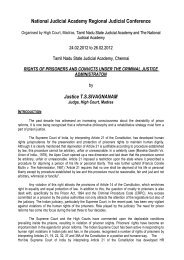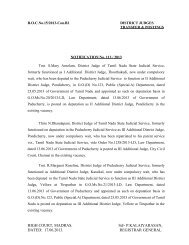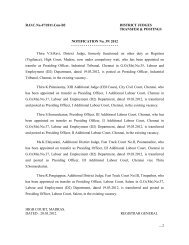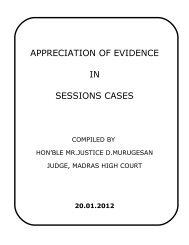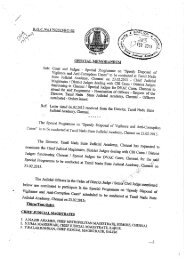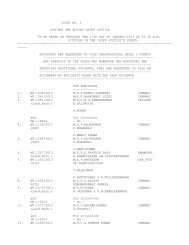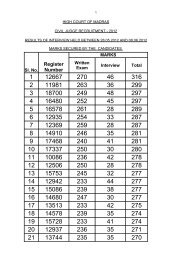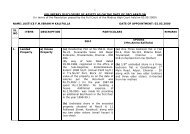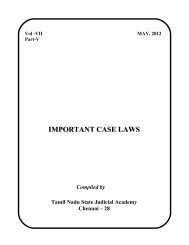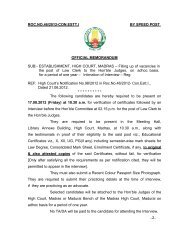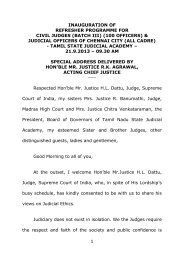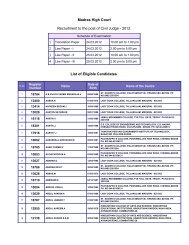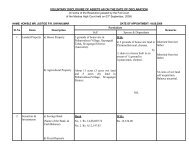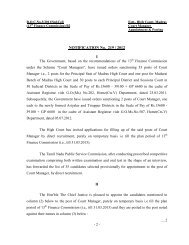IMPORTANT CASE LAWS - Madras High Court
IMPORTANT CASE LAWS - Madras High Court
IMPORTANT CASE LAWS - Madras High Court
You also want an ePaper? Increase the reach of your titles
YUMPU automatically turns print PDFs into web optimized ePapers that Google loves.
2011 (4) SCALE 614<br />
Rallis India Ltd.,<br />
vs<br />
Poduru Vidya Bhusan & Ors.<br />
NEGOTIABLE INSTRUMENTS – NEGOTIABLE INSTRUMENTS ACT, 1881 – SECTION 138 & 141 – Cr.P.C. –<br />
SECTION 482 – Quashing criminal proceedings – Cautionary note with regard to the manner in which <strong>High</strong> <strong>Court</strong>s<br />
ought to exercise their power to quash criminal proceedings when such proceeding is related to offences<br />
committed by companies – <strong>High</strong> <strong>Court</strong> could not have discharged respondents of the said liability at the threshold<br />
when there were several disputed facts involved – Appellant filed a criminal complaint u/s 138 and 141 of NI Act –<br />
Respondents denied their vicarious liability for the offences on ground that they had retired from the partnership<br />
firm in 2001/2002, i.e. much prior to the issuance of cheques in question in 2004 – In the complaint, sufficient<br />
averments had been made against respondents that they were partners of the firm, at the relevant point of time and<br />
were looking after day to day affairs of the partnership firm – Whether <strong>High</strong> <strong>Court</strong> was justified in quashing<br />
prosecution against respondents in exercise of its jurisdiction u/s 482, Cr.P.C – Allowing the appeal, Held,<br />
The primary responsibility of the complainant is to make specific averments in the complaint so as to make the<br />
accused vicariously liable. For fastening the criminal liability, there is no legal requirement for the complainant to show that<br />
the accused partner of the firm was aware about each and every transaction. On the other hand, proviso to Section 141 of<br />
the Act clearly lays down that if the accused is able to prove to the satisfaction of the court that the offence was committed<br />
without his knowledge or he had exercised due diligence to prevent the commission of such offence, he will not be liable of<br />
punishment. Needless to say, final judgment and order would depend on the evidence adduced. Criminal liability is<br />
attracted only on those, who at the time of commission of the offence, were in charge of and were responsible for the<br />
conduct of the business of the firm. But vicarious criminal liability can be inferred against the partners of a firm when it is<br />
specifically averred in the complaint about the status of the partners “qua the firm. This would make them liable to face the<br />
prosecution but it does not lead to automatic conviction. Hence, they are not adversely prejudiced – if they are eventually<br />
found to be not guilty, as a necessary consequence thereof would be acquitted.<br />
At the threshold, the <strong>High</strong> <strong>Court</strong> should not have interfered with the cognizance of the complaints having been<br />
taken by the trial court. The <strong>High</strong> <strong>Court</strong> could not have discharged the respondents of the said liability at the threshold.<br />
Unless parties are given opportunity to lead evidence, it is not possible to come to definite conclusion as to what was the<br />
date when the earlier partnership was dissolved and since what date the Respondents ceased to be the partners of the firm.<br />
**************<br />
11



